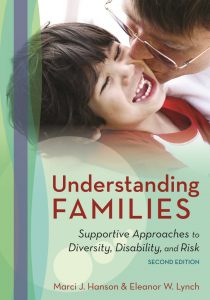25 Questions Early Childhood Professionals Should Ask Families
May 4, 2021
Today’s families are increasingly complex and diverse—and as a professional working with young children, you’ll need to gather a solid foundation of information as you partner with their families. This post includes a helpful list of 25 important questions to ask when you meet with a young child’s family. Excerpted and adapted from Understanding Families, Second Edition, by Marci J. Hanson, & Eleanor W. Lynch, these questions are a great starting point for learning about children and families and preparing yourself to meet their needs.
Family Composition
Ask questions like:
- Who is in the family? (Identify all the family members and their relationship to one another.)
- Which family members are the primary caregivers for children?
- Do family members make decisions together or does one member make the major decisions?
- What other family members or friends are included in the family’s circle of support? How are these other individuals included?
- Are family members employed outside the home?
Family Culture, Ethnicity, and Language
Ask questions like:
- With which cultural, ethnic, and linguistic groups does the family identify?
- What is their language of preference in communication with professionals?
- Is an interpreter needed for communication?
- Do family members have a preference for written materials or information through another medium, such as oral discussion?
- Do written materials need to be translated into the family’s preferred language?
Family Customs and Preferences
Ask questions like:
- How would family members prefer to be greeted (e.g., by title or by role, such as mother, father, grandmother, other)?
- Are service providers invited into the family’s home?
- What are the family’s customs in the home (e.g., removal of shoes when entering the home; shaking hands or not touching family members unless invited to do so)?
- Where and when would families prefer to meet or discuss issues?
- What are their hopes and dreams for the family and children?
Child-Rearing Practices
Ask questions like:
- What are family members’ beliefs about child development? Children’s goals? Children’s developmental milestones (e.g., toileting, feeding, caring for self)?
- What are family mealtime practices? Are there dietary preferences or restrictions?
- Who is responsible for feeding the children? What practices are used?
- What are the children’s sleeping arrangements and routines (e.g., does the baby sleep in the same room as the parents?)?
- What are the family’s beliefs about standards of behavior and discipline?
Education, Health Care, and Help Seeking
Ask questions like:
- What are the family members’ beliefs and perceptions about the developmental or health condition of the family member/child?
- What are the family’s beliefs and approach to health care or healing?
- What are the family members’ beliefs about education of the children (e.g., readiness for school, goals of school)?
- Does the family seek help from other family members or individuals? Does the family seek help from any formal agencies, organizations, or community services? For what services?
- Do family members agree about the use of services/supports and the approaches that they use?
For a fuller list of questions, see this downloadable version, ready to print and share as a tip sheet. And for a comprehensive guide to working effectively and sensitively with today’s diverse families, get the book:
 Understanding Families
Understanding Families
Supportive Approaches to Diversity, Disability, and Risk, Second Edition
By Marci J. Hanson, Ph.D., & Eleanor W. Lynch, Ph.D.
With a strong emphasis on family resilience, this book gets early childhood professionals ready to work with a broad range of families with diverse structures, backgrounds, and circumstances. Learn how to communicate and collaborate effectively with every family you serve, support families of children with disabilities, advance strong parent–child attachment and interactions, address risk factors, and more.




Write a Comment
Your email address will not be published. Required fields are marked *
Post a Comment